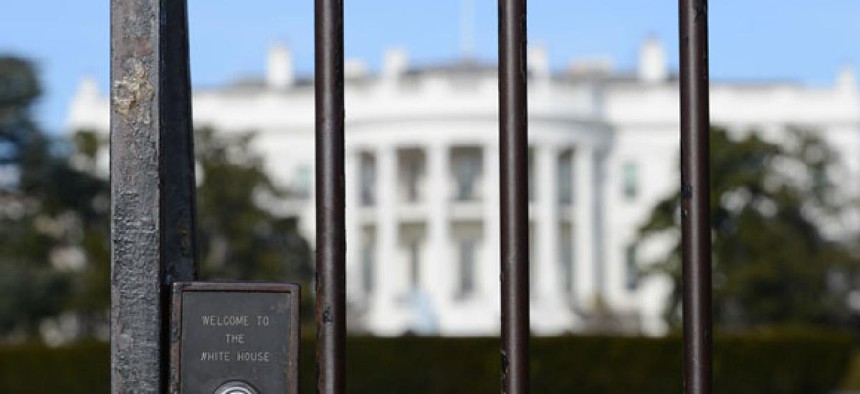
Orhan Cam/Shutterstock.com
Obama should step up enforcement of agency transparency, advocates argue
Without a White House champion, FOIA requests fall through the cracks, specialists say.
President Obama set the bar high in 2009 when he vowed to lead the most transparent administration in history, but an absence of follow-through to change agency culture will require new White House action during his second term, a panel of transparency activists agreed on Thursday.
After a first-day-in-office executive order promoting open government, the Obama team, “good intentions side, got distracted, and some officials later admitted that they had no idea how difficult and massive an undertaking this is,” said Patrice McDermott, executive director of the nonprofit coalition Openthegovernment.org. She spoke alongside allies in the transparency community at series of panels on transparency under Obama Thursday at American University law school.
“The culture varies dramatically at agencies, and the technology too,” McDermott said. “We should encourage the administration to think about their legacy, since the media will make or break the legacy.”
The problem, she said, is that there is “no one in the executive branch with clear accepted authority to ensure compliance,” noting the key role played initially by since-departed White House ethics czar Norm Eisen. Neither the Justice Department’s Office of Information Policy nor the National Archives and Records Administration’s Office of Government Information Services have the necessary resources or clout, she said, and many of the agency inspectors general are “not good on open government.”
Obama should involve the transparency community in formalizing a set of best practices, McDermott said. “Something that’s doable by the White House would work better for the public and for the agencies. If agencies had been updating and following the FOIA law, a lot of the litigation would become unnecessary.”
Tom Blanton, director of the private, nonprofit National Security Archive, said, “A little White House follow-through goes a long way.” After Obama’s first year, when the National Security Archive reported that only 13 of some 90 agencies had revised their FOIA processes, Chief of Staff Rahm Emanuel and Counsel Bob Bauer sent a joint memo to agencies and the next year’s total of agencies revising FOIA practices rose to 49, he said.
The kind of standards Blanton envisions in centralized guidance would alter the deadlines agencies work under to make them more favorable to the outsider who filed the request. “The clock has to start ticking when the request arrives, and the onus shouldn’t be on the requester,” Blanton said. Requesters should be allowed more time for appeals of decisions, and fees should be forgiven if the agency can point to a public purpose for the document search, as in requests from the media or students. “In planning a template of best practices, we have to end this daisy chain of endless delay and referral,” he said. “The core conundrum of our request-driven information system is that it is antagonistic.”
Sean Moulton, director of federal information policy at the Center for Effective Government (formerly OMB Watch), said that FOIA would be less needed if the government improved on the broader issues of transparency. “It isn’t a single policy or aspect of government implementation, but a way we want government to be, how it perceives its way of doing business,” he said, referring to declassification policies, access to electronic records, websites updating procurement information, and cooperation from “project managers further down the food chain” from FOIA officials.
For agencies, “It’s messy, it may be `gotcha’ journalism, it’s embarrassing and it hurts,” he said. “But in long run the agency benefits by correcting problems. And the public benefits from better outcomes. Too many officials focus on the short term, and transparency becomes a check-the-box thing. Some agencies see the public as their audience, other are more insular.”
Daniel Schuman, policy counsel at the Sunlight Foundation, spoke of “two Obamas, one who is a great transparency advocate and another who is a great defender of America. The two shouldn’t be in conflict,” he said. Obama initially rolled out a groundbreaking lobbying reform and achieved transparency on the 2009 Recovery Act stimulus spending, he said, “but a lot then fell by the wayside.”
Negative examples Shuman pointed to included not identifying donors to the presidential inauguration, not disclosing more about campaign gifts, and prosecution of some whistleblowers. Some disclosed document sets are incomplete, or are available only at obscure libraries and for a fee, he said. “Secrecy through obscurity is inimical to democratic process” he said. “Even if you have the right people, agencies still do what they want,” Schuman said, which is why the White House should codify best practices.
Josh Gerstein, White House reporter for Politico, praised Obama for regularly releasing the White House visitors log, but he criticized the absence of documents from military court martials and the administration’s decisions to prosecute some national security leaks cases in ways that challenge reporters’ privileged access. “I don’t understand some of the fights they pick if their No. 1 priority is transparency,” he said. He also frowned on the administration’s use of “loopholes” that allow secrecy of some meetings -- via conference call, for example -- of federal advisory committees. “Most political types,” Gerstein said, “were never onboard with transparency ever being more than a sales point.”
Mark Tapscott, executive editor of the Washington Examiner, also described a change in the Obama approach. “After the stimulus program and the media coverage of some of that waste, suddenly some officials had second thoughts and were even more doubtful about transparency,” Tapscott said. On FOIA, he’d like to know who makes the decision not to release documents. “As government gets bigger and more involved in our lives, political necessity creates greater pressure in government to be less transparent,” Tapscott said. “The next four years will be most important on FOIA since 1967,” the year FOIA was enacted.
(Image via Shutterstock.com)







